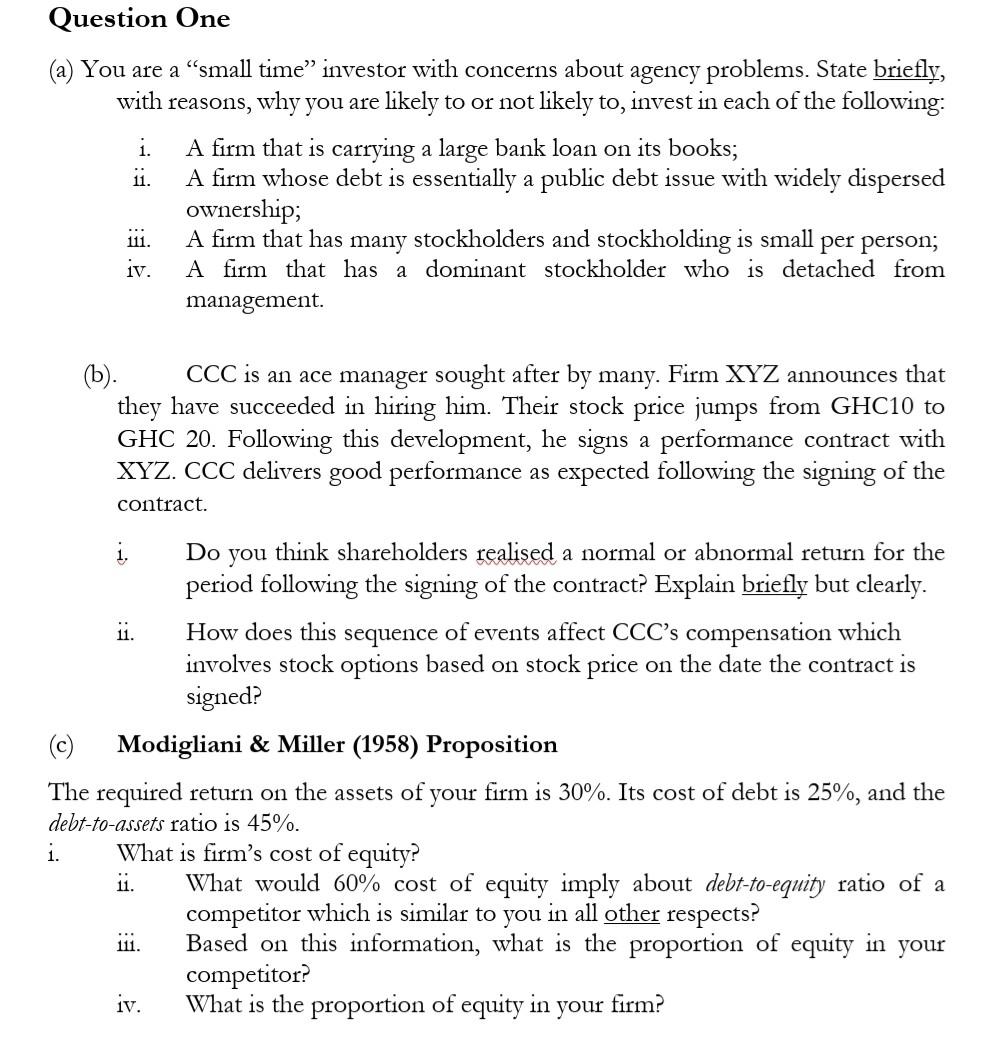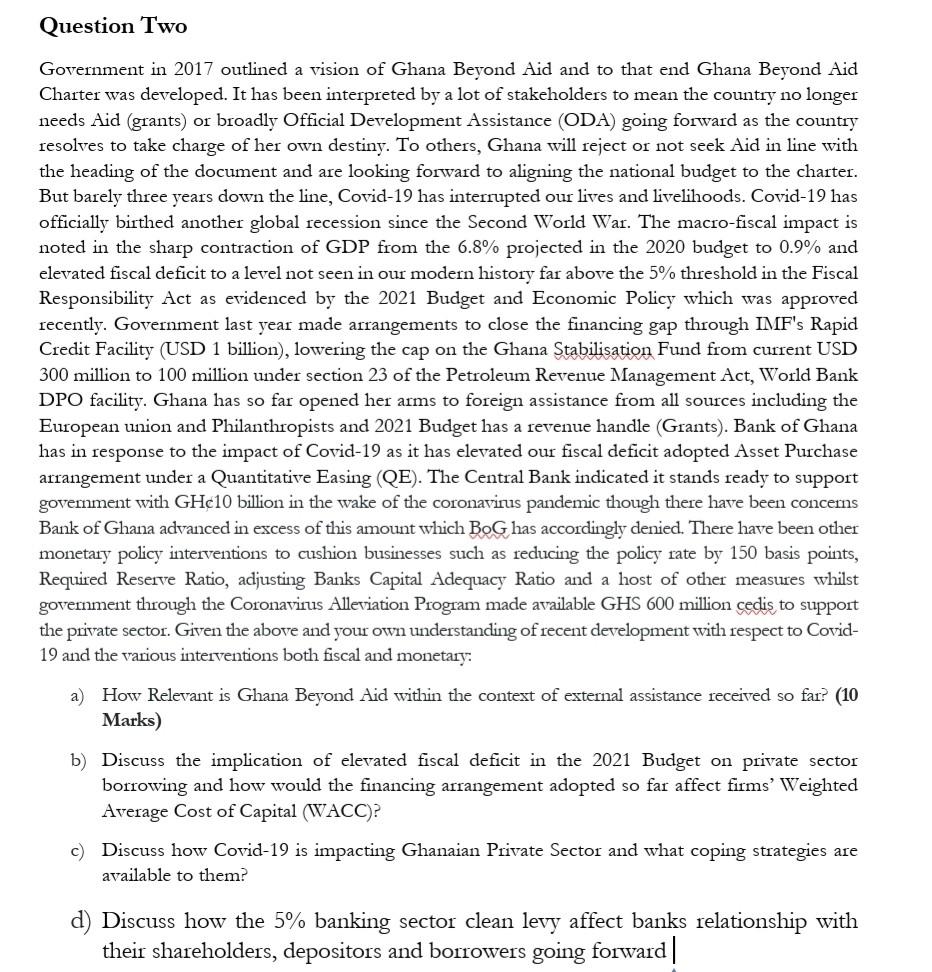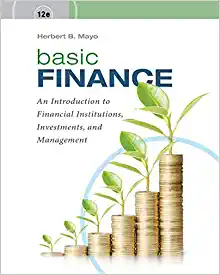Answered step by step
Verified Expert Solution
Question
1 Approved Answer
Question One (a) You are a small time investor with concerns about agency problems. State briefly, with reasons, why you are likely to or not


Question One (a) You are a small time investor with concerns about agency problems. State briefly, with reasons, why you are likely to or not likely to invest in each of the following: i. A firm that is carrying a large bank loan on its books; A firm whose debt is essentially a public debt issue with widely dispersed ownership; A firm that has many stockholders and stockholding is small per person; iv. A firm that has a dominant stockholder who is detached from management. 11. 111. (b). CCC is an ace manager sought after by many. Firm XYZ announces that they have succeeded in hiring him. Their stock price jumps from GHC10 to GHC 20. Following this development, he signs a performance contract with XYZ. CCC delivers good performance as expected following the signing of the contract. i. Do you think shareholders realised a normal or abnormal return for the period following the signing of the contract? Explain briefly but clearly. ii. How does this sequence of events affect CCC's compensation which involves stock options based on stock price on the date the contract is signed? (0) Modigliani & Miller (1958) Proposition The required return on the assets of your firm is 30%. Its cost of debt is 25%, and the debt-to-assets ratio is 45%. i. What is firm's cost of equity? What would 60% cost of equity imply about debt-to-equity ratio of a competitor which is similar to you in all other respects? Based on this information, what is the proportion of equity in your competitor? What is the proportion of equity in your firm? 11. 111. iv. Question Two Government in 2017 outlined a vision of Ghana Beyond Aid and to that end Ghana Beyond Aid Charter was developed. It has been interpreted by a lot of stakeholders to mean the country no longer needs Aid (grants) or broadly Official Development Assistance (ODA) going forward as the country resolves to take charge of her own destiny. To others, Ghana will reject or not seek Aid in line with the heading of the document and are looking forward to aligning the national budget to the charter. But barely three years down the line, Covid-19 has interrupted our lives and livelihoods. Covid-19 has officially birthed another global recession since the Second World War. The macro-fiscal impact is noted in the sharp contraction of GDP from the 6.8% projected in the 2020 budget to 0.9% and elevated fiscal deficit to a level not seen in our modern history far above the 5% threshold in the Fiscal Responsibility Act as evidenced by the 2021 Budget and Economic Policy which was approved recently. Government last year made arrangements to close the financing gap through IMF's Rapid Credit Facility (USD 1 billion), lowering the cap on the Ghana Stabilisation Fund from current USD 300 million to 100 million under section 23 of the Petroleum Revenue Management Act, World Bank DPO facility. Ghana has so far opened her arms to foreign assistance from all sources including the European union and Philanthropists and 2021 Budget has a revenue handle (Grants). Bank of Ghana has in response to the impact of Covid-19 as it has elevated our fiscal deficit adopted Asset Purchase arrangement under a Quantitative Easing (QE). The Central Bank indicated it stands ready to support government with GH10 billion in the wake of the coronavirus pandemic though there have been concerns Bank of Ghana advanced in excess of this amount which BoG has accordingly denied. There have been other monetary policy interventions to cushion businesses such as reducing the policy rate by 150 basis points, Required Reserve Ratio, adjusting Banks Capital Adequacy Ratio and a host of other measures whilst government through the Coronavirus Alleviation Program made available GHS 600 million cedis to support the private sector. Given the above and your own understanding of recent development with respect to Covid- 19 and the various interventions both fiscal and monetary: a) How Relevant is Ghana Beyond Aid within the context of external assistance received so far? (10 Marks) b) Discuss the implication of elevated fiscal deficit in the 2021 Budget on private sector borrowing and how would the financing arrangement adopted so far affect firms' Weighted Average Cost of Capital (WACC)? c) Discuss how Covid-19 is impacting Ghanaian Private Sector and what coping strategies are lable to them? d) Discuss how the 5% banking sector clean levy affect banks relationship with their shareholders, depositors and borrowers going forward Question One (a) You are a small time investor with concerns about agency problems. State briefly, with reasons, why you are likely to or not likely to invest in each of the following: i. A firm that is carrying a large bank loan on its books; A firm whose debt is essentially a public debt issue with widely dispersed ownership; A firm that has many stockholders and stockholding is small per person; iv. A firm that has a dominant stockholder who is detached from management. 11. 111. (b). CCC is an ace manager sought after by many. Firm XYZ announces that they have succeeded in hiring him. Their stock price jumps from GHC10 to GHC 20. Following this development, he signs a performance contract with XYZ. CCC delivers good performance as expected following the signing of the contract. i. Do you think shareholders realised a normal or abnormal return for the period following the signing of the contract? Explain briefly but clearly. ii. How does this sequence of events affect CCC's compensation which involves stock options based on stock price on the date the contract is signed? (0) Modigliani & Miller (1958) Proposition The required return on the assets of your firm is 30%. Its cost of debt is 25%, and the debt-to-assets ratio is 45%. i. What is firm's cost of equity? What would 60% cost of equity imply about debt-to-equity ratio of a competitor which is similar to you in all other respects? Based on this information, what is the proportion of equity in your competitor? What is the proportion of equity in your firm? 11. 111. iv. Question Two Government in 2017 outlined a vision of Ghana Beyond Aid and to that end Ghana Beyond Aid Charter was developed. It has been interpreted by a lot of stakeholders to mean the country no longer needs Aid (grants) or broadly Official Development Assistance (ODA) going forward as the country resolves to take charge of her own destiny. To others, Ghana will reject or not seek Aid in line with the heading of the document and are looking forward to aligning the national budget to the charter. But barely three years down the line, Covid-19 has interrupted our lives and livelihoods. Covid-19 has officially birthed another global recession since the Second World War. The macro-fiscal impact is noted in the sharp contraction of GDP from the 6.8% projected in the 2020 budget to 0.9% and elevated fiscal deficit to a level not seen in our modern history far above the 5% threshold in the Fiscal Responsibility Act as evidenced by the 2021 Budget and Economic Policy which was approved recently. Government last year made arrangements to close the financing gap through IMF's Rapid Credit Facility (USD 1 billion), lowering the cap on the Ghana Stabilisation Fund from current USD 300 million to 100 million under section 23 of the Petroleum Revenue Management Act, World Bank DPO facility. Ghana has so far opened her arms to foreign assistance from all sources including the European union and Philanthropists and 2021 Budget has a revenue handle (Grants). Bank of Ghana has in response to the impact of Covid-19 as it has elevated our fiscal deficit adopted Asset Purchase arrangement under a Quantitative Easing (QE). The Central Bank indicated it stands ready to support government with GH10 billion in the wake of the coronavirus pandemic though there have been concerns Bank of Ghana advanced in excess of this amount which BoG has accordingly denied. There have been other monetary policy interventions to cushion businesses such as reducing the policy rate by 150 basis points, Required Reserve Ratio, adjusting Banks Capital Adequacy Ratio and a host of other measures whilst government through the Coronavirus Alleviation Program made available GHS 600 million cedis to support the private sector. Given the above and your own understanding of recent development with respect to Covid- 19 and the various interventions both fiscal and monetary: a) How Relevant is Ghana Beyond Aid within the context of external assistance received so far? (10 Marks) b) Discuss the implication of elevated fiscal deficit in the 2021 Budget on private sector borrowing and how would the financing arrangement adopted so far affect firms' Weighted Average Cost of Capital (WACC)? c) Discuss how Covid-19 is impacting Ghanaian Private Sector and what coping strategies are lable to them? d) Discuss how the 5% banking sector clean levy affect banks relationship with their shareholders, depositors and borrowers going forward
Step by Step Solution
There are 3 Steps involved in it
Step: 1

Get Instant Access to Expert-Tailored Solutions
See step-by-step solutions with expert insights and AI powered tools for academic success
Step: 2

Step: 3

Ace Your Homework with AI
Get the answers you need in no time with our AI-driven, step-by-step assistance
Get Started


